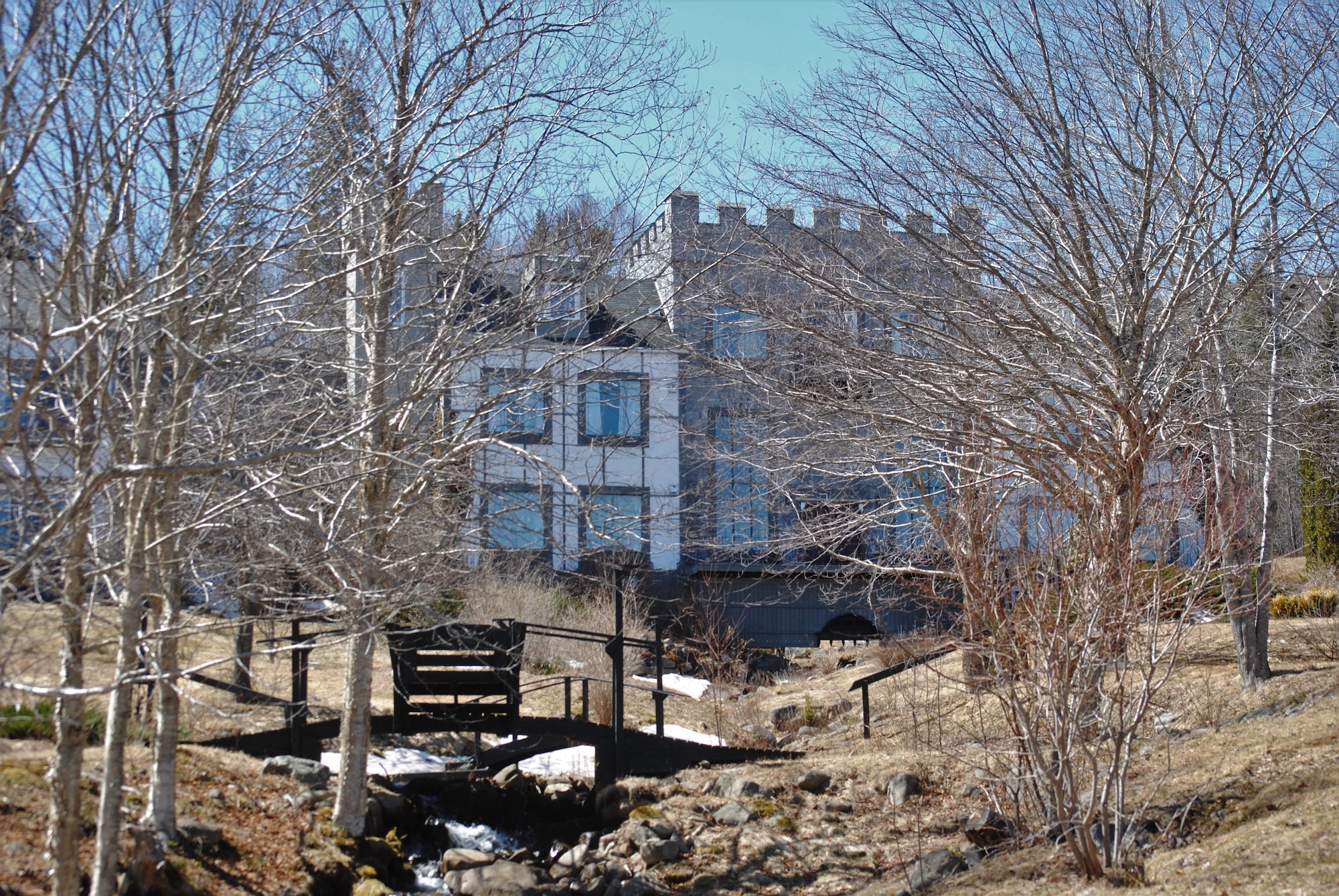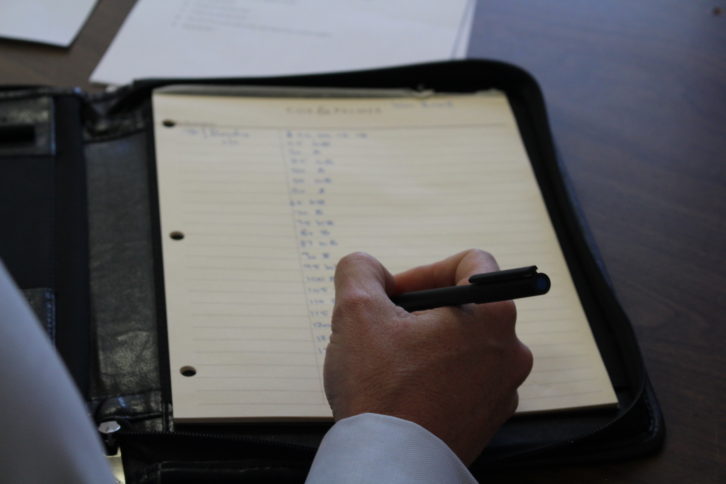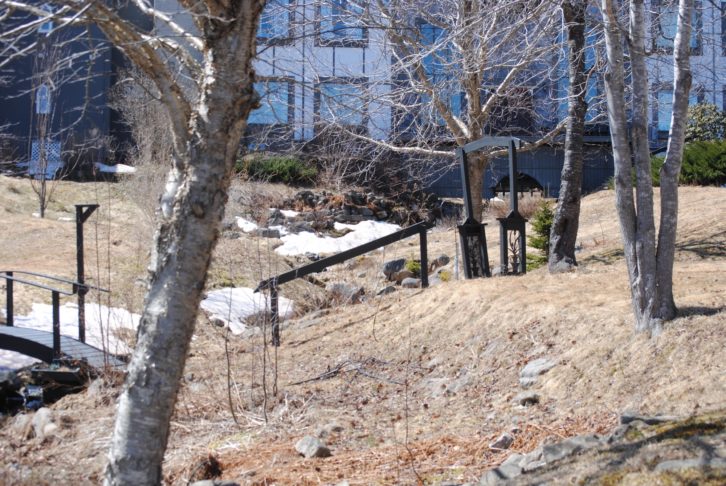When opportunity knocks

caption
Castle Gracie is seen through trees in mid-April,2019One person's misfortune can be another's opportunity
If you look to the northwest of the Trans Canada Highway in Bucklaw, Cape Breton, you might catch glimpse of a driveway with pillars to either side of the entrance.
Take a drive up the lane between two rows of conical evergreens, and you’ll find one of the island’s most unusual buildings.
Built in 1992 and set on 158 acres of hills and woodland overlooking Bras d’Or Lake, it resembles a castle, with towers and turrets and a brook flowing beneath the main part of the building. There are 10 suites, each with at least one fireplace, in the 8,515 square foot structure. As if that’s not enough, there’s a great hall with a fireplace, grand piano and staircases leading to the two wings, and a bar, wine cellar, sauna and gym downstairs.
This is also one of the most unusual foreclosures in recent Nova Scotia history, and a business opportunity for Debbie Gracie-Smith and Ken Gracie, a sister and brother from Ontario who set their sights on buying a cheap property or B&B in their birthplace of Cape Breton.
“The castle popped up on Facebook with an old story through CTV News saying ‘Somebody should by this castle and turn it into Hogwarts.’”
The couple found out it was in the foreclosure process, and jumped at the opportunity.
“We contacted a lawyer we knew from a family friend and …we got the castle.”
Fully furnished.
“Because it is on a hill,” she said, “the view is just stunning.”
The couple has rechristened it Castle Gracie.
While most people out to purchase a property never go near a foreclosure, and more than eight out of ten auctions examined by King’s students saw the lender buy the property for a nominal sum, the auctions do attract people willing to take the risk of buying a property they can’t look inside and which comes as is.

caption
A row of evergreens lines the driveway to Castle Gracie in Bucklaw, Cape Breton.The King’s analysis of foreclosure sales advertised in 2017 found 32 of the 63 third party purchases at auctions were in the names of individuals, 25 were in the names of companies, while the remaining six were lenders other than the foreclosing lender or mortgage default insurers.
Purchasers come with different goals in mind. A few might be looking for a property to live in. Others are looking for a rental property. In isolated cases, a secondary lender other than the foreclosing lender buys. And then there are the flippers, looking to buy and resell for a profit.
The concept is depicted on TV shows such as Flip or Flop or Property Ladder. They show contractors and real estate geeks taking foreclosure houses and bank-owned properties and renovating and sprucing them up for a profitable sale.
“I may have it seen it on TV. You know in the states where they are doing house flips and such. I think it stared from that, so I started doing my own research,” said Brian DeCoste, a contractor who develops these properties with his son, as a side business..
Angela MacLennan, who has been going to foreclosure auctions for two years, and has made a business out of flipping houses, said they come in “various level of condition.”
Ultimately none of them have been total gut jobs, but she’s “seen them close by times.”
“A little lucky”
“You can go and look at a house and think that it’s fine and when you decide that you’re going to change the siding you realize the walls are all eaten apart by ants,” said MacLennan.
That said, there is money to be made.
First time homebuyer and opportunity seeker Alexander Spires was looking for something he could buy, renovate and resell, but without too much risk.
“There was lots of room to be able to do the upgrades and they get it up to the level that I like to live in and still be able to flip and sell afterwards,” he said.
Spires, a chemical engineering graduate, did a lot of the renovations himself and then like MacLennan, contracted some of the work out.
“I was actually a little lucky on that house because I spoke with a realtor who knew who had owned it before and that a lot of the major plumbing work had been updated (and) any electrical before,” said Spires.
“It was definitely lucrative. I definitely made money off the flip, but sort of time consuming. Especially when working a full-time job.”
If you want to do this as your job, most buyers would agree that you should be handy yourself, or have a team you can fall back on.
“You do need a good lawyer at the ready that does know what you’re doing, because you’re going to have lots of calls on a regular basis. And your work crew, that’s your other thing. You need a good group to go to,” said MacLennan.

caption
A lawyer keeps track of bid prices at a foreclosure auction.“That seems to be the most challenging part. Drywallers tend to be the hardest thing for me to find.”
Homeowners are not the only ones who end up in foreclosure. Sometimes, home builders run into trouble before completion, and their tradespeople and contractors can be left without work—and pay.
Scott Coulter, owner of Evergreen Electric Ltd. in Dartmouth, said he sees this happen all too often. What he will often do is turn around and buy the property at the foreclosure auction out of his own pocket, finish it, and resell it.
In 2017, Coulter bought a home that he was working on, at auction, to make back some of the money he was owed that he never received.
Benefiting from misfortune
“It was half built, so it needed drywall, paint, trim, tapestry, final electrical, plumbing; it needed landscaping; it needed an air exchange.”
“In my perspective, it’s a hard thing to do because any of us who had a lien or anyone in the public could buy that house at the foreclosure, right, but a lot of guys who started the work there, they didn’t want to come back there and finish it because they wanted to overcharge me to finish it to make up for what they had previously lost.”
Even though he does this time and time again for profit, he said there is “not really any money” in it.
Of course, whatever money people do make on properties they buy at foreclosure auctions, they are in a way benefiting from the misfortune of others.
Alexis Leonard and her husband have been looking for a foreclosure property to rent, to build retirement income, and have attended a number of auctions without finding the deal they are looking for.
She recognizes that while having fewer bidders is good for people like her, in that it depresses prices and a lot could be done to make the auctions fairer for people losing their homes. She sees the process as rather one sided for the lenders.
“And so when they signed up for a mortgage…people are so excited when they get the keys to their first house, they’re thinking, ‘this is my home.’ They’re not thinking about when something could happen. And when it does happen, they find out that maybe they’re being taken advantage of a little bit, or a lot.”
An analysis of foreclosure auctions advertised in 2017 shows if there isn’t competitive bidding, there’s little incentive for bids to go much over the amount the lender is owed.
Children’s rooms
And then there are things that are just sad.
“You know, you see all the little girl’s rooms that are done up in pink or mauve and all the first christening gowns and stuff in the closet and family keepsakes and stuff and you feel for the children,” Angela MacLennan said.
But she added, “Sometimes you have to say all’s fair in business.”
Back at Castle Gracie, renovations have been underway.
At the time of the foreclosure, the castle was assessed for taxes at $865,700 and had been on the market for years, with the asking price dropping in steps from $3.99 million to $849,000, according to the Viewpoint.ca real estate website.
“I don’t know if it was pricing… I don’t know,” Gracie-Smith said, as to why it never sold.

caption
A brook runs under Castle Gracie in Cape Breton.Gracie Smith would not confirm the price the couple paid, but the public record indicates a selling price of $300,000.
The Royal Bank originally received the court’s blessing for what is called an approved sale, and in late 2006 reached an agreement to sell the castle for $370,000. A few months later, the original purchasers informed the bank they hadn’t been able to secure financing and that deal fell through. The public foreclosure auction was held in March 2018 in Sydney. According to the foreclosure deed the bank purchased the property, and nominated the Gracies’ numbered company to be given title. Joshua Santimaw, the lawyer for the bank, said in an email, “The bank accepted 300K.”
The order for foreclosure and sale, from March 2017, said the lender was owed $217,119.06.
While even $300,000 seems a huge discount Gracie-Smith said the couple found damage to the castle’s east tower, and had to demolish and rebuild it. An appraisal of the property done by Sydney firm Stokes Property Appraisal also noted there were signs of mold.
The Gracies are considering operating a B&B, though the Stokes appraisal raised doubts about the feasibility of running an inn with a full restaurant.
King’s students tried repeatedly to reach the prior owners, and once got someone on the line, but they hung up once the reason for the call was explained.

